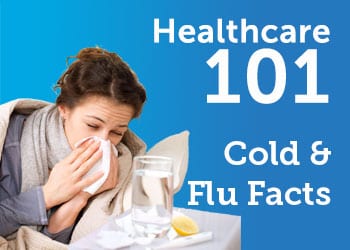Cold and Flu: Prevention, Treatment, Complications
November 18, 2015

Cold and Flu season is upon us yet again, but it seems that each year there is always the question as to whether or not you should be vaccinated. The CDC highly recommends that all Americans get vaccinated This includes both healthy individuals and groups who are at a higher risk of getting the virus. High risk groups include children, the elderly, people with compromised immune systems, and pregnant women (Read more in our FAQ on the Flu Vaccine.)
CareSpot is here to take care of you when you are ill, but our goal is to keep you healthy! It might seem like common sense, but the following reminders could keep viruses at bay:
- Wash your hands frequently and carry hand sanitizer.
- Stop the spreading of germs by not touching your eyes, nose, or mouth.
- Cover your nose and mouth with a tissue when sneezing. Don’t have a tissue? Sneeze into your elbow — viruses can cling to bare skin.
- Disinfect frequently touched surfaces on a regular basis! This includes remote controls, phones, nightstands, door knobs, etc. Viruses that cause colds and the flu can survive on common surfaces for up to 72 hours.
- Drink water to stay hydrated and strengthen your immune system.
If you do get sick with the flu, be sure to visit CareSpot or your PCP, but also take the following steps:
- Drink plenty of water to flush the system. It is recommended that you drink eight or more 8-ounce glasses of water each day.
- Stay home and limit exposure to others.
- Talk to your medical professional about the importance of taking probiotics after you finish your antibiotics. It’s important to build your system back up.
The flu is not something to be taken lightly. Listen to your body and if you are feeling worse, visit your PCP or CareSpot immediately. Surprising complications that can arise from the flu include:
- Dehydration
- Bronchitis (inflammation of the bronchi, the airways that branch off the trachea)
- Ear infection (more common in children than in adults)
- Myocarditis (inflammation of the heart muscle)
- Myositis (muscle inflammation)
- Pericarditis (inflammation of the sac that surrounds the heart)
- Pneumonia, viral (from the flu virus itself) or bacterial
- Sinus infection (more common in children than in adults)
- Worsening of chronic medical conditions such as asthma, diabetes, or congestive heart failure
